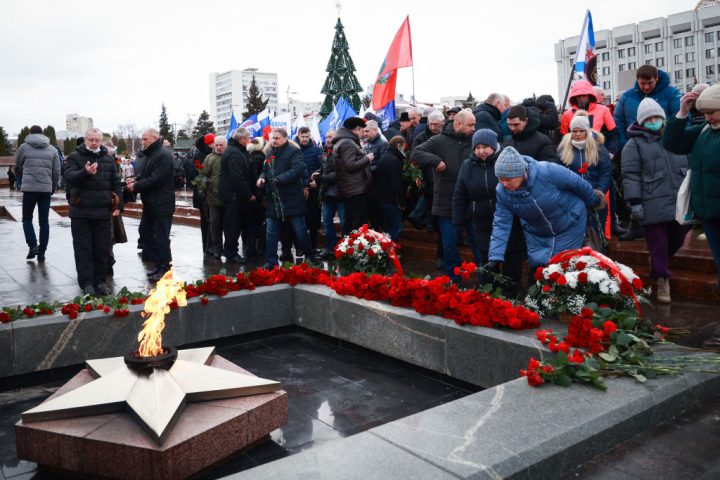At one minute past midnight on 1 January, as Putin uttered the last words of his new year’s address, Ukraine sent six Himars rockets into the Russian-occupied territory of Donetsk. Four landed on a vocational school in the town of Makiivka, which had been acting as a temporary Russian military base, reducing its buildings to rubble.
The domestic fallout for Russia is proving messy. From the moment they announced news of the strike, the Russian Ministry of Defence (MoD) has made considerable efforts to downplay the death toll and pin the blame for the incident on the dead Russian soldiers themselves. They, the MoD says, are the reason Ukraine knew where to find them.
On 2 January, the MoD said that 63 Russian personnel had been killed in the strike. Meanwhile, the Ukrainian army said that in fact nearly 400 soldiers had been killed, and 300 injured.
The true number of soldiers killed is likely to remain unverified, but it is safe to say the initial Russian figure was an underestimate, likely by quite a margin. In the early hours of this morning, the Russian MoD revised the death toll to 89 after more bodies ‘were found in the rubble’.
Even without this revision, the number of lives lost as declared by Russia is the largest confirmed by the Kremlin since September. The MoD’s acknowledgment of casualties, and the update to the death toll are significant, particularly against the backdrop of months of military setbacks that has seen the department increasingly backed into a corner by a leadership keen to avoid blame.
The ministry’s attempt to wriggle its way out and pin blame on the very people dying is a strategy that may yet backfire
Since news of the strike broke in Russia two days ago, the domestic reaction has been one of anger. This is not least because there are suggestions by military bloggers that some of the casualties are men forcibly recruited during Putin’s chaotic partial mobilisation in September. Additionally, anecdotal first-hand accounts from survivors are confirming suspicions domestically that the army is covering up the true number of deaths.
The milblogging community has, so far, directed its anger at the Russian MoD and army command of the Donetsk People’s Republic, and not the Kremlin. Pro-Kremlin military analyst Rybar has accused the military leaders of ‘criminal naivety’ and ‘neglecting common sense’, not least for stationing so many army personnel in one place and, according to some rumours, next to a munitions depot which exploded in the strike, thus contributing to the death toll.
However, in its statement last night, the MoD made an attempt to wriggle out of the trouble it now finds itself in. Just days after Putin praised the ‘heroes of the special military operation’ in his new year’s address, the MoD turned on those who had been killed in the strike. The reason the Ukrainian military had been able to pinpoint their location, they said, was not the MoD’s fault at all. In fact those servicemen killed were themselves responsible, due to their widespread covert use of banned private mobile phones to communicate with family and friends back home. Ukraine, the MoD said, was able to trace these calls and use them to pinpoint the army base’s location.
While this is impossible to verify, this explanation can’t be discounted. In the early days of the war, Ukraine was able to intercept Russian military comms because their commanders started communicating via local phone networks after destroying the 3G and 4G networks their secure lines depended on. Just as likely, however, is some as yet undisclosed military incompetence on the part of the Russians as seen at various points throughout the last 11 months of conflict.
The MoD’s refusal to accept responsibility for the strike or casualties is a risky strategy, and one it appears elements of the Russian public are not buying. Residents in Saratov, where some of the soldiers stationed at the vocational school were said to be from, have called on the region’s governor to ‘tell the truth’. Under a social media post advertising a hotline for tracing mobilised men from the Samara region stationed at Makiivka, locals questioned the government’s official line. ‘The easiest thing to do is to blame the mobilised men themselves’, one Russian woman wrote mournfully.
As Russia’s military disasters pile up, the Kremlin will continue to position its MoD as a scapegoat and allow it to bear the brunt of Russian anger and frustration at the war. The ministry’s attempt to wriggle its way out and pin blame on the very people dying is a strategy that may yet backfire, not just for them, but the whole of Putin’s regime.







Comments